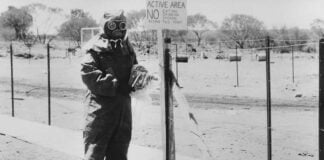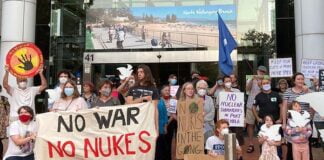In early May the Rudd government released Defending Australia in the Asia Pacific Century: Force 2030, a White Paper detailing their defence plans for the coming years. The paper argues for a further melding of Australian and US military forces and an extension of Australia’s imperial reach in the Asia-Pacific region.
Upon their election, the Rudd government committed to continuing the astronomical defence spending that was core business under the Howard government. This White Paper ups the ante, committing to three per cent real growth in defence spending every year until 2017/2018. $72 billion in new military spending is flagged in the paper.
The navy is planning to use this money to double its submarine fleet and purchase three new destroyers and eight new frigates. All of these will be equipped with land-attack cruise missiles, making Australia “the first regional defence force to have this potent weapons system.” The Australian newspaper celebrated the ability to “strike at targets thousands of kilometres from Australia’s shores.”
The RAAF is going to spend its early Christmas present on 100 Joint Strike Fighters, capable of short and medium range bombing. The money it costs to buy these alone could convert the entire country to 100 per cent renewable energy by 2020.
The key policy rationales behind this seemingly obscene spending are the two most prominent planks of the Rudd’s government defence policy: a continued relationship with the imperial giant the Untied States and a growing “awareness” of rising star China.
In the Defence White Paper, this “awareness” translates into building a domestic arsenal that would allow the Australian armed forces to compete with China in the event of a military conflict.
During the Talisman-Sabre war games set to begin across Northern Australia this July, 8000 Australian and 15,000 US troops will undertake joint training to strengthen their “inter-operability”.
The Rudd government wants to maintain the foothold that the Howard government achieved in the Asia Pacific. In selling this focus Rudd said, “It follows very plainly that here in the Asia Pacific region there are uncertain parts of the region. We simply need to take a calm, measured, responsible approach for the future to make sure that our Army, Navy and Air Force have the resources they need for the future.”
Nothing says “calm and measured” like 100 Joint Strike Fighters and a new cruise missile system.
Literally millions of people across Australia grew sick and tired of the Howard government’s militarism. From the wars in Iraq and Afghanistan to the adventures in the Asia Pacific, opposition to war mongering was part of what inspired a change of government in 2007.
The Defence White Paper illustrates that the Rudd government is offering little in the way of an alternative in the area of defence. Rudd is maintaining occupations in the Middle East, along with in East Timor and the Solomon Islands.
At a time when billions of dollars are so sorely needed to protect people’s jobs and build renewable energy infrastructure, we have an increasing commitment to defence spending. We do not need a government that commits to backing the US’s efforts to maintain its supremacy—we need it to tear up commitments and fund things that will improve lives, not destroy them.
By Ernest Price





